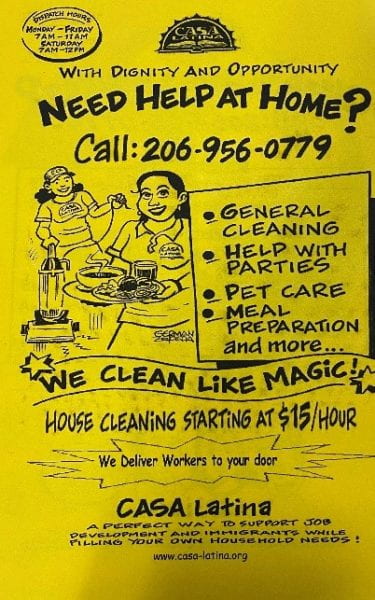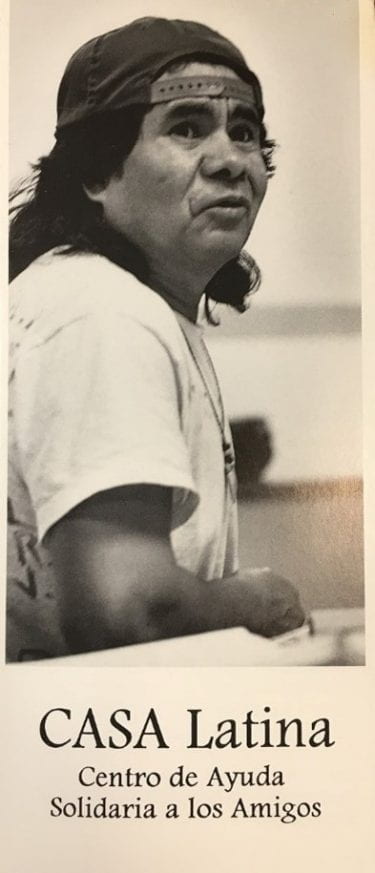October 16, 2020
Labor Archives of Washington Spotlight: Creating Bilingual Access to Collections Documenting the Latinx Experience
This summer, the Labor Archives of Washington (LAW) within the UW Libraries Special Collections, was lucky enough to have Diana Rocha, MLIS student from the University of Illinois Urbana Champaign, complete their final semester practicum with us. Working remotely, Diana enhanced access to several important collections documenting the histories of the Latinx community in Washington. These collections are of great significance for academic research at the UW and beyond. Students and faculty, historians, journalists and other researchers can use these primary sources to better understand topics such as Latinx history in Washington State, labor organizing, activism, non-profit work, and immigrant rights.
CASA Latina records

CASA Latina flyer for labor dispatch hall and house cleaning hiring services (CASA Latina records, Accession No. 5975-001)
The CASA Latina records document the founding and early history of the Seattle-based worker center and Latinx and immigrant worker advocacy non-profit organization, CASA Latina. Founded in 1994, CASA Latina now runs a labor dispatch hall and offers training programs such as ESL classes, job skills and safety trainings, and community organizing in Seattle’s Central District. The collection includes paper and digital records related to the history, governance, founding, funding, finances, operations, and programs of CASA Latina as well as newsletters, flyers, photographs, and digital captures of the organization’s website.
Diana worked to enhance the description of the collection in the online finding aid published in the Archives West finding aid database. Finding aids are research guides to archival collections which include records of organizations and papers of individuals and families, that provide information about the collection contents, how to access and use the materials, and historical background about who created or compiled the collection. Part of Diana’s work enhancing the finding aid included creating series and subseries for the inventory of collection contents, making the finding aid easier to navigate for researchers. Diana also translated the entire guide into Spanish, including the biographical information about CASA Latina and the scope and content note which describes the material types one will find and the subject matter covered by the collection. This is the LAW’s second bilingual finding aid. To learn more about the CASA Latina records, you can view the bilingual finding aid here!
Farmworker History
In addition to their work on CASA Latina, Diana also translated oral history interviews with Washington farmworker organizer Rosalinda Guillén and former United Farmworkers of Washington President Julio Romero (stay tuned for digital access to these interviews). Also accessible for research are the papers of Rosalinda Guillén and Joseph Moore, a collection that documents their work as labor organizers, including their roles in the successful organizing campaign to unionize farm workers at Chateau Ste. Michelle (Washington’s largest winery) in the 1990s. This finding aid was translated into Spanish in 2015 and is the first translated finding aid of the LAW’s bilingual finding aid program. In 2015, the LAW also created an online bilingual exhibit in both English and Tagalog on Filipino American author, poet, and farm worker organizer Carlos Bulosan.
Enhancing Equitable Access to Our Collections
One of the Libraries Strategic Directions is to enhance equitable access for research, learning, and working. If we bring in a collection from a community, it is critical that community members can access their own historical records, especially for non-white, non-English speaking or working class communities that have been historically underrepresented in special collections and archives. LAW’s program of translating access tools for collections like CASA Latina documenting the histories of communities where English is not the primary language, are an important part of providing equitable access to our resources. Similarly, LAW provides the option for non-English speaking oral history interviewees to be interviewed in their primary language whenever possible. Transcriptions are then created in the original language of the interview before being translated into English.
Once public operations resume, researchers can access these materials in the Special Collections Research Room located in the Allen Library South Basement. You can learn more about using the collections, including how to prepare for your research visit, on the Special Collections webpage.
Finally, a big thanks to Diana Rocha for their excellent work in enhancing access to these collections and helping move us forward in our endeavor to be a more equitable Libraries for our researchers!
Additional Resources:
For more on the history of farmworkers in Washington State, view a recording of the 2016 Labor Archives’ Annual Event which featured Guillén and Romero as speakers.
LAW’s segment on “We Do the Work” radio also discussed Washington farmworker history and the Guillen-Moore collection.

